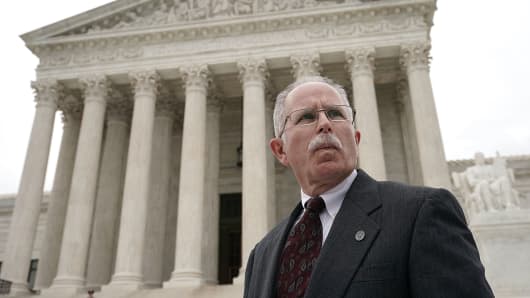- Experts said that a holding in favor of Janus would be the most significant court decision affecting collective bargaining rights in decades.

Alex Wong | Getty Images News | Getty Images
Plaintiff Mark Janus passes in front of the U.S. Supreme Court after a hearing on February 26, 2018 in Washington, DC. The court is scheduled to hear the case, Janus v. AFSCME, to determine whether states violate their employees' First Amendment rights to require them to join public sector unions which they may not want to associate with.
The Supreme Court ruled 5-4 Wednesday that non-union workers cannot be forced to pay fees to public sector unions.
"Compelling individuals to mouth support for views they find objectionable violates that cardinal constitutional command, and in most contexts, any such effort would be universally condemned," wrote Justice Samuel Alito, who authored the court's opinion in the case, Janus v. AFSCME.
The case, one of the most hotly anticipated of the term, is the second in two days to hand a major victory to conservatives, following Tuesday's holding by the court that President Donald Trump's travel ban is constitutional.
Some experts have said that a holding in favor of Janus would be the most significant court decision affecting collective bargaining in decades
.
.
Trump hailed the ruling immediately after it was handed down. In a post on Twitter, the president wrote that the decision was a "loss for the coffers of the Democrats."
Mark Janus, an employee at the Illinois Department of Healthcare and Human Services, asked the court last summer to overrule a 40-year-old Supreme Court decision. It found that public sector unions could require employees affected by their negotiations to pay so-called "agency fees," which have also been called "fair share fees."
Those fees, approved by the court in the 1977 case Abood v. Detroit Board of Education, cover collective bargaining costs, such as contract negotiations, but are meant to exclude political advocacy.
Janus argued that his $45 monthly fee to the American Federation of State, County, and Municipal Employees was unconstitutional. He said the fees infringed on his his first amendment rights, and that, in the case of public employees whose contract negotiations are with the government, the fees were a form of political advocacy.
He argued that there was little distinction, for instance, between requiring employees to fund unions that engage in political lobbying and requiring them to fund political groups such as the Democratic Party.
The union argued that the agency fees prevent free-riding from employees who benefit from the union's negotiations. AFSCME argued that, because it was obligated by law to represent the interests of both union and non-union members, the fees were a way for employees to pay their fair share for contact negotiations from which they benefited.
Avoiding free riders, Alito wrote, "is not a compelling interest."
"Many private groups speak out with the objective of obtaining government action that will have the effect of benefiting nonmembers," he wrote. "May all those who are thought to benefit from such efforts be compelled to subsidize this speech?"
The case is the third in five years on the question of fair share fees to come before the Supreme Court. In 2014, the question came to the court in Harris v. Quinn, but the justices declined to answer the central question over agency fees' constitutionality, and instead ruled 5-4 that the petitioners in the case were not public employees.
In 2016, the court issued a one sentence opinion in Friedrichs v. California Teachers Association that left the question open.
MORE FROM CNBC

No comments:
Post a Comment